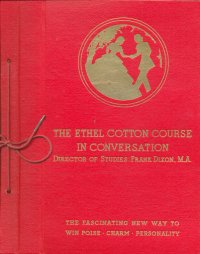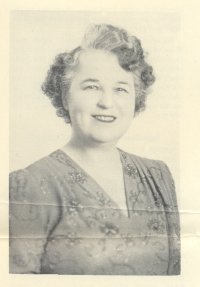Do YOU suffer from poor conversational skills? Although nowadays I may seem confident to the point of arrogance, I used to be just like you. My own failings in social intercourse embarassed me so much that if I was approached by an acquaintance in the street, I'd frequently run away to another town and start a fresh life under an assumed name, rather than risk exposing my inadequacies to public ridicule.
Now, though - thanks to the wisdom of Ethel Cotton as displayed in her priceless Course in Conversation - I am a different man. In every situation I conduct myself with unshakable poise, conversing freely on various topics with a cultivated diction. Take the following example of a Good Conversation about Art. It comes from the second lesson of Ms Cotton's course, but it could equally have been recorded at one of my own little soirées:
“I feel that I should have enjoyed the exhibition more if I had read something about art,” one girl remarked.
She turned to her friend. “You've been to the museum so many times - how do you judge a statue or know which one is supposed to be good?”
“I took a course of lectures on Art Appreciation,” responded the friend. Then she described briefly the three approaches to sculpture, as she understood them.
“In the portrait bust,” she explained, “the sculptor really does photographic work. Then there is the portrait plus imagination, when the artist adds a touch of his fancy to reality. The third is the symbolic statue, which is an imaginative conception of the sculptor. When I look at a statue I inquire what the sculptor has tried to do or say. If he has accomplished his aim, then, as I understand it, it is good work whether I happen to like it or not.”
(My own discourse is not as yet as elevated as this young lady's, as I haven't yet taken the lectures on Art Appreciation, though I do wonder whether Duchamp's Fountain, for example, can rightly be called a “symbolic statue” ).
Not only art but any subject can form the basis of a conversation. Through taking the Cotton course I've come to realise that the proper reason for participating in any activity is in order to have something to address one's fellows on at the first opportunity. Even the humble radio has a part to play, as Ethel instructs us:
Radio programmes, with the variety of tastes for which they cater, afford excellent conversational material, and with the prospects of advance in television technique, there is every possibility of radio-listening becoming more of a social affair, rather than a domestic relaxation, which it is at the moment. Your day may not allow you a great deal of time for listening, but the secret of furnishing your mind with good conversational material is selective listening. Do not have the radio on merely for the sake of background noise. Learn to listen intelligently, and study the programme beforehand.
With this approach, you'll soon learn to have Good Conversation about Radio Programmes, like this one:
“Did you listen to last week's ‘Focus’ programme?”
“Yes. Excellent, wasn't it? I think the experiment has been a tremendous success. Gives us an insight into problems we're apt to think we know all about. It's an education.”
“What do you think of those ‘Progress Report’ programmes?”
“Very interesting. Give you an insight into the other fellow's job. Show how we depend on one another. They're a good lesson in practical Democracy.”
Scintillating stuff. But Ethel recognises that we can't be so serious all the time. Conversation should have a leavening of that ingredient we are pleased to call “humour”:
You will find humour in the unusual use of words. The use of a word with two meanings, which is called a play on words or a pun, is a popular type of light humour. For example “Stunt flying will stunt flying” Another example is calling our rich relatives “the kin we love to touch.”
Oh, Ethel, you wag!
The avid conversationalist is not only witty, but broad-minded, with a range of interests:
In selecting your hobbies, cultivate a wide sweep. [...] One business man of my acquaintance spends occasional evenings about the docks of a large port.
A great way to enlarge your personal circle, indeed. Another of Ms Cotton's examples, a Mrs B, “liked to experiment with people in strange cities”. But you don't have to go so far:
Ordinary things about the house may be used as leads for many interesting discussions. A couple I know read an extract from a motto calendar every Sunday morning at breakfast. [...]
Another family used a calendar of historical pictures, illustrating message carriers of all ages. [...] By becoming interested in the pictures, then reading the short historical references, members of this family have enjoyed discussing message-carriers of different periods from 3800 B.C., to the present time.
I'm sure we must all envy that family.
As a final summary of Ms Cotton's work, could anyone improve on these words from Elizabeth King, M.A., Instructor in Latin and Art?
“It is difficult to imagine any person not being thoroughly aroused right in the very first Lesson and keyed at the very beginning to definite activities, every one of which will work to his own betterment.”
I concur: since following Ms Cotton's course I have been continuously aroused to definite activities. For example these days I never listen to Chris Moyles' radio programme until I have studied beforehand an appropriate preparatory text. Doing so decidedly works to my own betterment.
Incidentally, Ethel Cotton's only other book, Keeping Mentally Alive (1931), sounds like it might perhaps be of interest to Chet Fleming.


Your course seems to be male…
Your course seems to be male ordinated
I find this rather disturbing especially coming from a woman
We woman have fought for decades to be free from that situation and along comes a woman crashing all of that hard work
I have some very prominent people in government that would not take kindly to your course
Not wanting to upset the…
mm
mm
Is anyone familiar with the …
Is anyone familiar with the "studio talks" that those taking the course are advised to study before reading each of the twelve lesson? Any information is appreciated.
Thank you.
Marie
I would be interested in
I would be interested in buying a set if someone has a set for sale, I’m in Australia
Hi Barbara, Are you still
Hi Barbara, Are you still interested. I have a full set of 12 in as new condition, I'm located in Adelaide.
I ordered Miss Cottons
I ordered Miss Cottons conversation course when I was a teenager and thoroughly enjoyed it. That would have been in the early 70s. Wish I had hung on to it!
I have a set for sale on
I have a set for sale on Amazon. It's listed under Crownebooks, if anyone is interested.
Hi Dori,
Hi Dori,
I have the collection and call sell it.
Please contact me at dbendl@hotmail.com.
Sincerely,
David Bendl
Are you selling this set?
Are you selling this set? Shipping?
Dori, I am not a bookseller,
Dori, I am not a bookseller, although I do occasionally sell items from my collection. I don't plan to sell this one, though. It's easy enough to come by, if you search online, eg here.
Are you selling the set? What
Are you selling the set? What is the price and does it include shipping?
This was recently reviewed by
This was recently reviewed by Studies in Crap:
http://blogs.sfweekly.com/exhibitionist/2012/03/ethel_cottons_1960_cour…
Ethel Cotton was my
Thanks Jane, always glad to
Thanks Jane, always glad to learn more about the authors featured on the site.